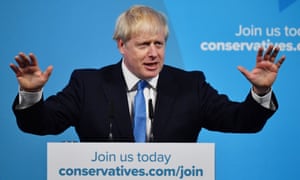
I want to begin by thanking my opponent, Jeremy - an absolutely formidable campaigner, a great leader and a great politician. In the course of 20 hustings events ... you have been friendly, good-natured, a fount of brilliant ideas all of which I propose to steal. And above all, I want to thank our outgoing leader, Theresa May, for her extraordinary service to this party and to this country. It was a privilege to serve in her cabinet and to see the passion and determination that she brought to the many causes that are her legacy.
This is a generous tribute to Hunt, who ran a more attacking campaign than many people had expected, challenging his rival’s seriousness and knack of dodging difficult questions. His praise of Hunt’s “brilliant ideas” suggests he will have a significant role in Johnson’s cabinet by Wednesday night. The tribute to May is a lot more perfunctory.
There will be people around the place who will question the wisdom of your decision. And there may even be some people here who wonder quite what they have done. And no one person, no one party, has a monopoly of wisdom.
This is Johnson’s tongue-in-cheek nod to the fact there will be many people in Johnson’s own party who feel deeply concerned about his appointment and the seriousness he will bring to the office – not to mention his pledge for a “do-or-die” Brexit and his eye-watering spending pledges. There is perhaps a hint here that he intends to seek cool-headed advice, as he suggests he does not have “a monopoly of wisdom”. That is the hope that many of his doubters still hold.
Today, at this pivotal moment in our history, we again have to reconcile two sets of instincts, two noble instincts, between the deep desire of friendship and trade and mutual support and security between Britain and our European partners, and the simultaneous desire equally deep and heartfelt for democratic self-government in this country. Some people say they are irreconcilable and it just can’t be done.
This is the beginning of Johnson’s charm offensive towards the remainers in his party – three of whom have quit the government over the past week in anticipation of his victory. He suggests he understands their instinct to keep close ties with the EU, but also talks about one of the least controversial pulls of the leave campaign – the desire for self-government – something that will appeal to most Conservative MPs regardless of their stance on Brexit.
I read in my Financial Times this morning ... that no incoming leader has ever faced such a daunting set of circumstances. Well, I look at you this morning and I ask myself: do you look daunted? Do you feel daunted? I don’t think you look remotely daunted to me. I think we know we can do it and the people of this country are trusting us to do it and we know that we will do it.
Johnson is certainly facing a daunting set of circumstances – a promise to deliver Brexit in just 18 working days once parliament returns from recess, dire economic forecasts if he pursues a no-deal Brexit, and a mutinous parliament where his majority could be just one by the end of next week. But this part of the speech is the red meat for the believers in the party who have elevated him – believe, and all these things can be overcome. Predictably, there is no detail about how.
We know the mantra of the campaign – in case you have forgotten it – it is deliver Brexit, unite the country and defeat Jeremy Corbyn and that is what we are going to do. Some wag has already pointed out that deliver, unite, defeat was not the perfect acronym for an election campaign since unfortunately it spells dud. But they forgot the final e, my friends, e for energise. And I say to all the doubters: dude, we are going to energise the country.
It was briefed to some newspapers by allies that a newly serious Johnson would be the one who enters Downing Street. This section of the speech seems to put paid to that – it is classic Johnson, a gag likely to have even raised a smile from his most trenchant critics. It also gives a nod to Tory MPs who might be tempted to sabotage his premiership, reminding them of the possible outcome of a Jeremy Corbyn government.
We are going to get Brexit done on 31 October, we are going to take advantage of all the opportunities that it will bring in a new spirit of can-do. And we are once again going to believe in ourselves and what we can do and like some slumbering giant we are going to rise and ping off the guy ropes of self-doubt and negativity.
Johnson returns to comfortable territory, a set of metaphors about a belief in Britain, a “slumbering giant” bound with guy ropes, for some reason. It is a jibe at his predecessors, May and her chancellor, Philip Hammond, who heeded the warnings about the havoc that could be wreaked by a chaotic no deal. Johnson has now set himself an unenviable task of showing that force of will and optimism is enough to overcome the political reality.
https://www.theguardian.com/politics/ng-interactive/2019/jul/23/boris-johnsons-victory-speech-what-he-said-and-what-he-meant